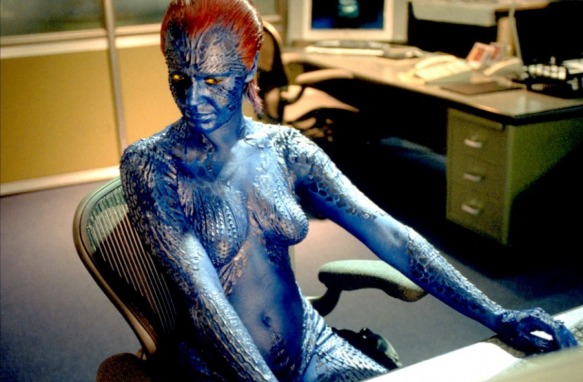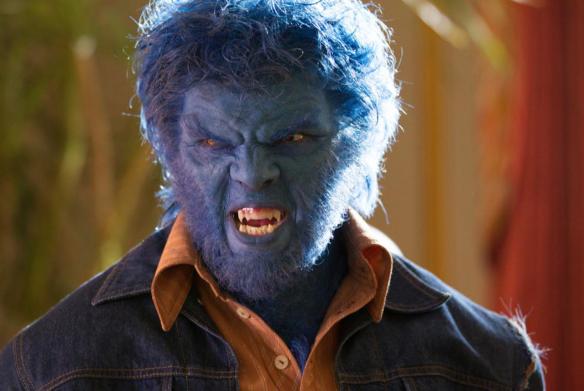
Rebecca Romijn-Stamos is feeling blue.
(2003) Superhero (20th Century Fox) Patrick Stewart, Hugh Jackman, Ian McKellen, Anna Paquin, Halle Berry, Rebecca Romijn-Stamos, Bruce Davison, James Marsden, Famke Janssen, Brian Cox, Alan Cumming, Shawn Ashmore, Aaron Stanford, Kelly Hu, Katie Stuart, Kea Wong, Cotter Smith, Chiara Zanni, Daniel Cudmore, Peter Wingfield, Shauna Cain. Directed by Bryan Singer
As I write, moonlight shines down blue as sapphires through my open window. I can see a four-leaf clover clearly in the grass of my front lawn. If a haystack were at hand, I could unerringly find the needle hidden therein. Actually, none of those things are happening, but it feels as if they could. After all, I’ve just witnessed the extremely improbable: a sequel better than the original. Hard to believe, but true.
When last we left the X-Men (in 2000), their greatest foe, Magneto (McKellan) was confined to a plastic prison, unable to use his powers to escape. Rogue (Paquin) was back among the students at Xavier School, sporting a cool white streak in her hair after her ordeal on Liberty Island. Wolverine (Jackman) was leaving for Alkali Lake, a facility in Canada where some clues to his past might be found. To get there, he liberated a motorcycle belonging to Cyclops (Marsden). And Senator Kelly (Davison) had come out against the mutant registration bill he had sponsored. Of course, we know that the good senator was really Mystique (Romijn-Stamos), but that’s just our little secret.
As this sequel opens, the White House is under attack from a single mutant; a blue-skinned, acrobatic guy with a long tail and the ability to teleport. He takes on the Secret Service and dispatches agents with nearly no trouble, threatens the President (Smith) with a knife before teleporting out of the Oval Office, leaving the commander-in-chief more susceptible to his Mutant Affairs advisor, Colonel. Styker’s (Cox) suggestion that he raid the Xavier School, which he described as a training facility for mutants. Of course, it sounded much more sinister when he said it.
About this time, Wolverine returned home to Xavier’s School, having found nothing but rubble and deserted buildings at Alkali Lake. The attack on the president, obviously carried out by a mutant, troubles Professor Xavier (Stewart). He decides to send two of his most capable X-Men, Storm (Berry) and Jean Grey (Janssen) to retrieve the President’s attacker. Professor X uses his neato-keeno computer Cerebro, through which he is able to connect with every living person on the planet, to find the blue teleporter. Professor X also decides to pay his old pal Magneto a visit, taking Cyclops with him.
While visiting Magneto, Professor X finds out something horrible; the secret of his school has been compromised by Magneto. Not willingly; Magneto would never betray his own kind to humans. Using an acid-like substance applied to the back of the mutant’s neck, Col. Stryker was able to control the powerful Magneto just enough to get him to reveal the information Stryker wanted; the exact location of Cerebro. Too late, Professor Xavier realizes he is caught in a trap and both he and Cyclops are gassed into unconsciousness.
At the same time, Storm and Jean Grey have found the mutant responsible for the attack on the White House, a pious German named Kurt Wagner, or as he was known in the Berlin Circus, Night Crawler (Cumming). Rather than being a dangerous villain, he’s actually rather sweet and endearing. Puzzled, Storm and Jean arrange to transport the German back to the Xavier School. It’s about here they lose contact with everybody.
Of course, things are not going too well at the School. Under attack from deadly commandos who menace shrieking children with what looks like Tasers, the soldiers find the mutant children to be a little harder to capture than they may have thought. Some, like Kitty Pryde (Stuart) are able to literally walk through walls to escape. Some, like Colossus (Cudmore) grow an impenetrable metal armor on their skin. Others, like Bobby Drake (Ashmore) can create walls of ice. And Wolverine? Well, he just kicks ass.
Wolverine escapes with Rogue, Bobby Drake, and a kid with attitude named Pyro (Stanford) who can manipulate fire. They go to Boston, where Storm and Jean Grey are and where Bobby Drake’s family lives. It leads to an awkward confrontation with Bobby’s parents, leading to one of the best lines of the movie; “Have you tried NOT being a mutant?” whines Bobby’s rather dense mother. Unfortunately, before any kind of understanding is reached, Bobby’s brother calls the police, which leads to a great deal of destruction and injury, most caused by Pyro. Things threaten to get WAY out of hand before Storm and Jean Grey arrive to whisk Wolverine and the kids away.
Now we find out what the reason for all this is. Col. Stryker doesn’t just fear mutants. He doesn’t just hate mutants. He wants to kill all of them. Permanently. And, using a second generation of Cerebro based on the components he’s stolen from the school, he has the means to do it in Professor Charles Xavier. Of course, the X-Men have no choice but to rescue their mentor, stop the genocide and save the day. And they have acquired a most unlikely ally: Magneto, who has escaped from prison in a rather clever (but gruesome) way. And, Mystique.
This uneasy alliance leaves you wondering about Magneto’s own agenda, which manifests itself in a spectacular way. The inevitable rescue attempt will lead to a surprise outcome in which one of the X-Men will defect to Magneto, and another will face the ultimate challenge. And when did this start sounding like a comic book?
The special effects are far more extensive here than in the first movie, and utilized more effectively. The fight scenes between Nightcrawler and the Secret Service, Wolferine and Lady Deathstrike (Hu) and Pyro and the Boston Police are done well, marrying expert fight choreography with special effects that bring to life the powers of the comic book heroes. Visually, the movie never lets up.
The X-Universe that Marvel Comics has created has a rich tapestry of characters from which to draw; many standbys, such as Gambit, Beast and Angel, have only been glimpsed so far in the movies.
What really sets X2 apart from its predecessor is the depth that is given to the characters. Jean Grey faces, in one of the movie’s better subplots, the increase of her own powers beyond her own abilities to handle them. Stryker is evil, but not in a cartoon-like manner. His hate is the man’s driving force, his fear the engine that powers his hate. His fear of mutants has hit his home in an impactful way, and drives him to exploit even those closest to him to meet his genocidal objectives.
Storm has always been one of the more enigmatic figures in the comic; she is aloof, distant and cold, but also loyal and fiercely determined. Berry plays her with all her vulnerabilities intact, quite a juxtaposition for a character able to create dozens of tornadoes with a thought.
That is, perhaps, why we relate to the X-Men so well; they are powerful, yet completely human, with all the vulnerability and frailty that implies. Even Magneto, the arrogant master of magnetism, is not all-powerful. Hugh Jackman captures Wolverine’s essence: feral and utterly devoid of conscience when fighting, but tormented by a past he cannot remember, held hostage to questions he can’t answer. Some of his questions are answered during the course of X2 but of course not all of them and several new ones arise in the process.
Wolverine’s defense of the Xavier School is one of the most vicious fight scenes ever filmed in a superhero movie and while it got cheers from the audience, it also left me a bit unsettled. There is something about stabbing a soldier with diamond-hard, razor-sharp claws that is more violent than beating him into unconsciousness with closed fists, or shooting him with a rifle. It made me wonder how far one can stretch the concept of “good guy” when the good guy is stabbing people. It’s all psychology; stabbing is a far more personal act than shooting someone. Dead is dead either way, but in our culture, heroes don’t stab.
Cumming portrays Nightcrawler as a tormented, but gentle soul whose faith is the rock that he clings to, even when his faith is sorely tested. He’s almost puppy dog eager to please his new friends so when the rubber hits the road he is there for them at great personal risk to himself. Cumming makes excellent use of his screen time, making his character one that you want to see more of.
Keep an eye out for Colossus, as well. The audience really reacted to his limited onscreen time; you can bet the filmmakers are taking notice of this for a future movie in the series although to this point that hasn’t happened yet.
The true test of a movie can be broken down to a single old saw: did the audience leave wanting more? X2 has got it all; eye candy, subtle undercurrents to which most of us can relate, characters who are not cartoons (another irony, given that this is based on comic books), big explosions, terrific fight scenes, everything for the summer movie Neanderthal in all of us. X2 is a perfect popcorn escape.
WHY RENT THIS: All the action you an ask for. Character depth and sophisticated story. Perfect summer popcorn movie.
WHY RENT SOMETHING ELSE: Still gives short shrift to some of the characters.
FAMILY MATTERS: Plenty of comic book violence, a bit of sensuality and brief rough language.
TRIVIAL PURSUITS: Entered the Guinness Book of World Records on its opening day by getting the most number of screens for a single movie on its opening day ever.
NOTABLE HOME VIDEO FEATURES: The special edition DVD release included a feature on Nightcrawler and rehearsal footage of the fight sequence between Wolverine and Lady Deathstrike as well as a web-based Q&A session from the film’s release date. The Blu-Ray adds a history of the comic book X-Men as well.
BOX OFFICE PERFORMANCE: $407.7M on a $110M production budget.
COMPARISON SHOPPING: Marvel’s The Avengers
FINAL RATING: 9/10
NEXT: The Wind Rises











